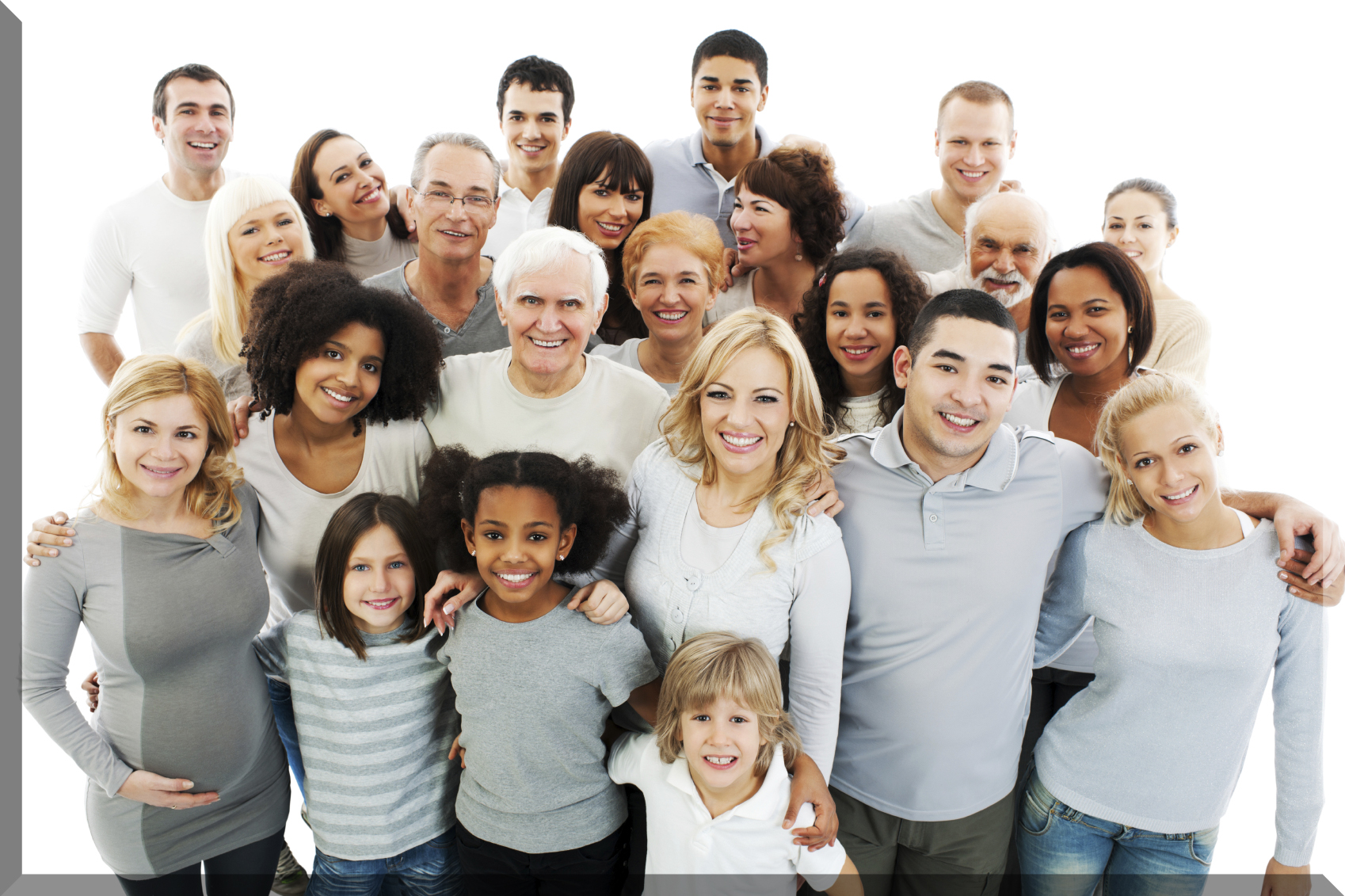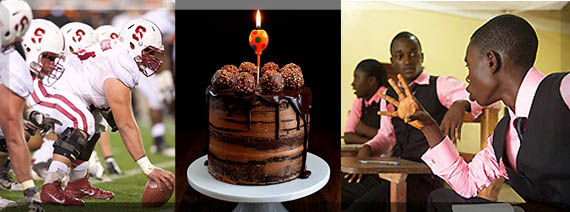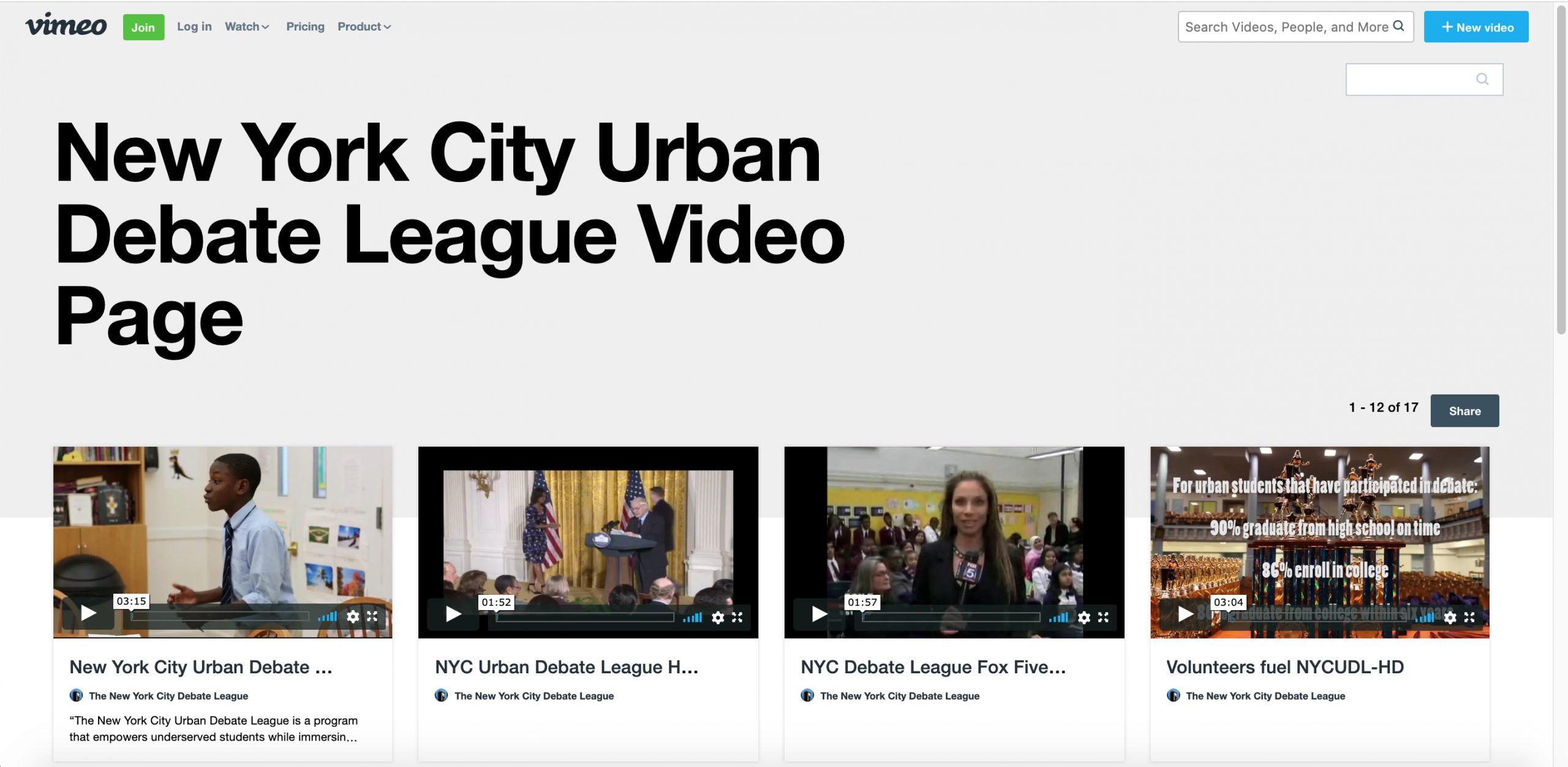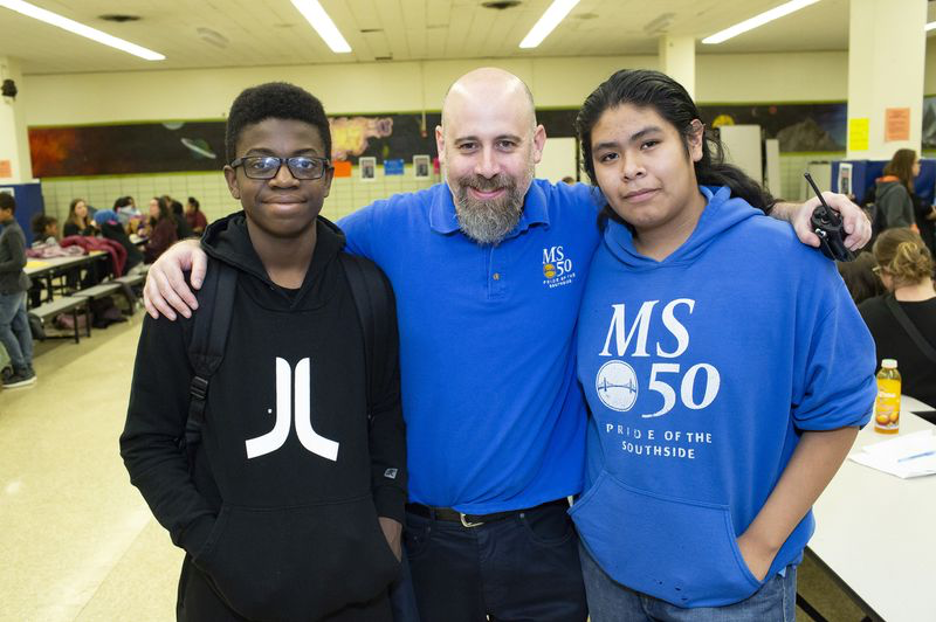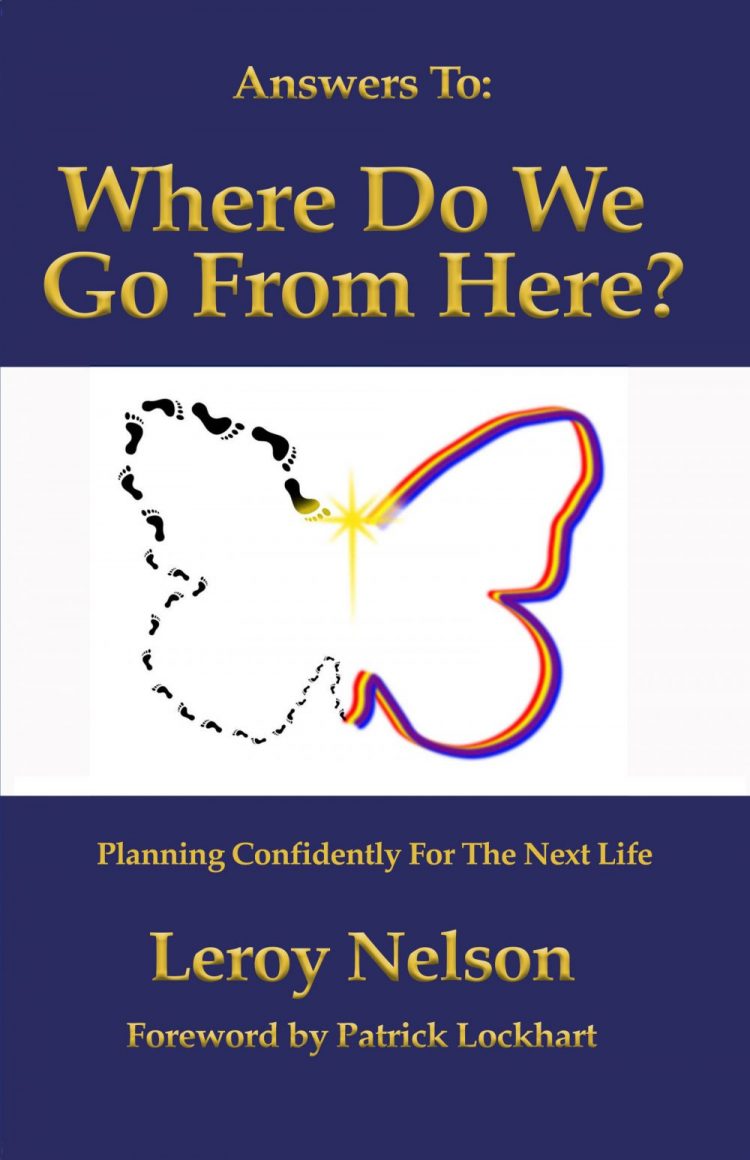Icing On The Cake
We’ve been working hard for several years to develop a program that encourages a new kind of debating. Classroom debating is a new specialized (but not complicated) form of debating that has been adapted for teaching core subject matter like Algebra, History and Biology, in contrast with the debating teams and tournaments we’re all pretty familiar with as formal debate.
In the process of our research and writing we took a long look at the relationship between debating and sports, comparing how both sports and debating help kids in school do better. There has been some controversy in the past over whether sports takes away from academics but that has been pretty well discounted by new research that shows broad positive academic benefits from both sports and debate. Both provide a broad basis from which to build cognitive, interpersonal, academic, and life skills. I like to think of debating and sports together like a cake.
Everybody likes cake because cakes are just plain fun to eat, just like both debating and sports are great fun if they are properly “baked”. Some people will say that the best part of the cake is really about athletics and if you are a student involved in athletics then being involved in debating would just be icing on the cake. But then I think there’s an equally good argument that debating is the whole cake and sports is better thought of as the icing – if you really have to take one over the other. But who takes the icing over the cake, or vice versa?
Now, I happen to be a guy who loves icing, and I’m lucky that my wife happens to like the cake part, and so she gives me her icing and I win-win with double icing (miraculously she doesn’t ask me for my cake part in exchange) but I don’t I think the point here is irrelevant to the Debate/Sports metaphor I’m offering up. Which one is the icing and which one is the cake, and who likes which part better doesn’t really matter because they both hugely complement each other and if enjoyed together everything is improved.
So debating is good for the athlete and maybe a little more interest in sports would be good for at least some debaters. Athletics have, at times, been considered not in the same wheelhouse as academics, but we think that we can get the Sports community and the Debating community to become aware that they have much more in common than either realizes and we are working to bring that connection into the light. We believe that the debating community should be raised up to be equivalent to a sport – something to be proud of and to be part of as fans just the way people get involved with sports.
In many ways sports and debate are already connected. Some of the best debaters that are out there are sports debaters and if you just watch how they debate sports on Saturday and Sunday morning you’ll see what I mean. You don’t see how efficiently they debate because they have a coach constantly talking in their ear. Just like any Lincoln-Douglas debater they are given 90 seconds to make their point and they have to do it with facts. They bring a lot of experience and opinion to what they’re talking about, but it’s always backed up with facts and research. I mean when you’re done listening to one of these sports commentators talk you definitely have the facts. You know what they were basing their decision on and what the factual basis of their argument was. Even if you have nothing to do with sports watch them sometime – you’ll see some of the best most articulate debating you’ll ever encounter next to going into watching Parliamentary or Lincoln Douglas level debating.
So when it comes to debating and sports I want the whole cake – don’t think for a minute I like just the icing. I like the whole debate/sports cake because I know the whole cake tastes best and if the whole cake not only tastes better but makes me a better person and a smarter person (that’s some cake!) then you can bet I want the whole cake and I also want that whole cake for every student in every school as a regular part of their diet.
NYC Urban Debate League Rocks!
Over the past two years as we’ve been developing World Debating Forum we’ve had the opportunity to review many different kinds of school-based debate programs, and there are none more exciting to us that what we see happening in the New York City Urban Debate League. It’s one thing to read the deep academic research on how debating can change the lives of young people from challenging backgrounds and
it’s another thing altogether to see and hear these kids tell their own stories.
The New York City Urban Debate League is responsible for reaching out to thousands of young people from every kind of background and circumstance and raising them up through the power of debate. Whether it’s increased high school graduation rates, reduced dropout rates, fewer young people falling victim to drugs and alcohol abuse, or radically increased lifetime earnings – all of these benefits of debate are made available at schools throughout the city by this energized debate-centered organization of teachers, coaches, students, administrators and community supporters.
We recently spend a full day browsing the video collection on the NYC Urban Debate League’s website and we would like to invite you to do the same. If you care about the lives of our young people who are facing challenges that rival the greatest ever faced by older generations, visit this website and listen to the stories of the young people. They will inspire you and fill you with pride in what they have been able to accomplish. These stories may also challenge you, as they did us, to envision this same program for every community.
Great Example Of How Debate Can Change Young Lives
As much as we would like to we can’t add to this New York Daily News article about the Brooklyn Middle School that just five years ago was down from 1200 students to a bare 165 students before Ben Honoroff and his staff turned the school into one of the best schools in the five boroughs by making debating a major driver of classroom education. The debate program has taken MS 50 from almost being closed down to being one of the best schools in New York City. We believe in the power of debate to change lives and this is one of the best examples of this principle that we’ve seen.
Principal Honoroff and his kids should be extremely proud and our hats are off to all of them – and their parents! This article shows how debate gives kids incentive to work harder and learn more while being easier and a lot more fun for the teachers. Our sincere congratulations to the kids of MS 50 and to Ben Honoroff and his great staff!
“Unlikely Brooklyn middle school debaters best in the five boroughs — and maybe in the USA”
By WES PARNELL and Larry McShane
NEW YORK DAILY NEWS |
Middle School 50 principal Benjamin Honoroff is proud of his debaters, including Grant Shan Jr, (left), 14, and Kevin Ascencion, 13.
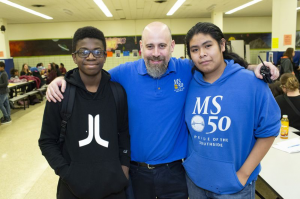
(Kevin C Downs for New York Daily News)
There’s no argument here: The debate team at Middle School 50 is breaking down its opponents — and stereotypes.
The squad from the Williamsburg school, just three years from nearly closing its doors for good, is now one win away away from reaching the national championships in Houston.
“We constantly not only compete against schools with more funding, but we also win,” said proud school principal Ben Honoroff. “It’s working harder, smarter and longer … I leave school inspired every day.”
The Brooklyn school remains an unlikely launching pad for the fast-thinking youths who captured the last three citywide debate titles. Just three years ago, with the student population down from 1,200 to just 165 over the previous two decades, the school teetered on the edge of extinction.
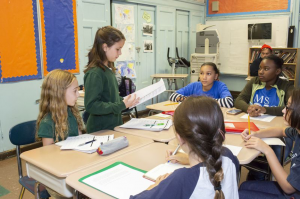
Students debating whether junk food or healthy food should be served in schools in New York City. Middle School 50 in Willliamsburg, Brooklyn.(Kevin C. Downs for New York Daily News)
But the program, available for students in either English or Spanish, altered both the future of the school and its participants. Enrollment now stands at 300, with one in kids five enrolled in the debate program.
On Saturday, the team members hosted a debate for 100 students from seven local elementary schools as they spread the good word.
Student Diego Pena, a Dominican native who came to MS 50 in early 2017, cited the debate team for his metamorphosis from a kid with no dreams to an aspiring attorney.
“It teaches you how to think, how to analyze both parts of the argument,” said Pena, a star student who now works with younger debaters. “The debate is something grand that opens your mind to many things.”
The Texas trip is not the first national attention for the MS 50 debaters. New York’s Democratic Rep. Nydia Velazquez previously honored the team with a speech and a plaque on the floor of the House of Representatives.
The program began with just four students in 2013. While morale and membership exploded, not everything has changed: Nine out of 10 of the school’s poverty-stricken students still qualify for a free lunch.
Janier Espinal, a fifth-grader, hopes to join the MS 50 squad next year. With the aid of the older students, he notched a pair of first-place finishes Saturday in Spanish-language and individual debate.
“I feel like I’m doing something big,” said the Dominican immigrant, who one day hopes to work in the White House. “I always wanted to come here to learn English, help my family and get a better life.”
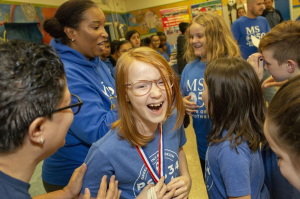
A student from Public School 34 debating team is joyful after winning a medal.(Kevin C. Downs for New York Daily News)
Eighth-grader Kevin Ascencion, 13, recalled how the competitions boosted his self-confidence and ability to handle pressure.
“It’s really nerve-wracking going against top-ranked schools,” said the son of two Mexican immigrants. “But it helps you to be competitive and teaches you how to step up.”
Parent Steve Guerrero, father of 10-year-old debater Juaquin, was stunned by the composure of the kids.
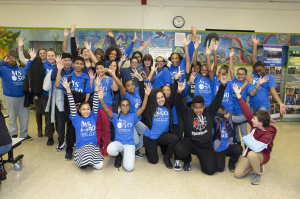
The members of the MS 50 debate team are seen at the school in Brooklyn. (Kevin C. Downs for New York Daily News)
”I would have never expected kids of this age to be this articulate,” he marveled. “I would have vomited and started crying if I had to do this when I was 10 years old.”
MS 50 teacher Caroline Hidalgo, who launched the Spanish language team, recalled breaking down in tears when Pena told her about his hopes.
“I never thought I created a difference like that,” she recounted. “Now every time I wake up in the morning, I wake up with more life knowing that I am making a good impact.
Free Book & New Video On Near Death Experiences
Here at No Hate No Violence Press we’re excited! We’ve just published our newest book “Answers To: Where Do We Go From Here? Planning Confidently For The Next Life” and we want you as our valued subscriber to have priority access to this groundbreaking publication for free (see link below).
“Answers To:” offers dozens of fascinating first-person stories of Near-Death Experiences. Every chapter includes published clinical research along with personal reports of an existence beyond this life by people who have died and then returned to life often with detailed and even fully verifiable experiences.
One of the most profoundly moving chapters chronicles the experiences of Veterans who have committed suicide and then, often miraculously, returned from death. We believe in the author’s vision so deeply that we’ve made this chapter into our newest YouTube video Please click here We hope this video will inspire viewers with thoughts and visions of the immense value of human life.
The changes that people make in their lives after a Near Death Experience (NDE) are often miraculous – watch, listen and hear for yourself!
This video reveals through narration and visual imagery the experiences of people who have committed suicide and then been met and urged to go back by long-lost friends and family on the other side. The stories told by these fortunate people who have been given a second chance are inspiring even for those of us who may never have contemplated the tragic, senseless act of suicide or its true consequences.
After you watch the YouTube video, we’ve arranged with Smashwords, a major international distributor, to make the full digital edition with dozens of hyperlinks to Near Death Experience research and stories available to you free – click here to get this free groundbreaking book!
We would also like to announce an exciting new way to experience this inspiring evidence of the afterlife. We’ve worked with renowned narrator & voice actor Tim Little, whose voice has inspired millions of audiobook fans, and who has narrated our new YouTube video, to produce a full audiobook edition of “Answers To: Where Do We Go From Here?”.
After you order your free book please pass this offer on to your friends and family, especially if you know someone who might benefit from this book right now in these troubled times.
Let’s Enjoy life! Pass It On!
Patrick Lockhart
Founder and CEO: No Hate No Violence Press
Life Never Ends
This testimonial came from my ex sister in-law who is Jewish, she got it from her priest brother in-law. This is a great example of what we could see after the virus subsides; with the rightAttitude, If we Help, love and think of others,We have no room in our hearts for hate. These words speak for themselves. Thanks sister and Father Garry.They say that in Wuhan after so many years of noiseyou can hear the birds again.They say that after just a few weeks of quietthe sky is no longer thick with fumesbut blue and grey and clear.They say that in the streets of Assisipeople are singing to each otheracross the empty squares,keeping their windows openso that those who are alone may hear the sounds of family around them.They say that a hotel in the West of Ireland is offering free meals and delivery to the housebound.Today a young woman I know is busy spreadingfliers with her number through the neighborhoodso that the elders may have someone to call on.Today Churches, Synagogues, Mosques and Templesare preparing to welcome and shelter the homeless,the sick, the weary.All over the world people are slowing down and reflecting.All over the world people are looking at their neighbors ina new way.All over the world people are waking up to a new realty to how big we really are,to how little control we really have,to what really matters.To love.So we pray and we remember thatYes, there is fear,but there does not have to be hate.Yes, there is isolation,but there does not have to be loneliness.Yes, there is panic buying,but there does not have to be meanness.Yes, there is sickness,but there does not have to be disease of the soul.Yes there is even death.But there can always be a rebirth of love.Wake to the choices you make as to how to livenow.Today, breathe.Listen, behind the factory noises of your panicthe birds are singing again.The sky is clearing.Spring is coming.And we are always encompassed by Love.Open the windows of your soul.And though you may not be ableto touch across the empty square,Sing.
Debating: Not Only An Artform
A lot of people comment that debating is an Artform. I agree with them completely, but I also like to think of debating as an intellectual sport. But much like viewing art that hangs on a wall, or watching a sporting event on television, you need to understand what goes into what you’re seeing to fully appreciate it.
I’m not an overly educated person when it comes to art. There’s some art I like, and some I don’t. But I do know there’s more to art than what I see. If I don’t understand or study an artform, like I do with debating, I won’t appreciate a lot of pieces because I won’t understand what to look for or know what goes into creating something. This is similar to watching sports.
Take a soccer game, for instance. If you don’t understand the rules, you won’t like the game. If you do understand the rules, the complexity of the game is pretty enjoyable. This is how my brother and I are when it comes baseball. My brother loves it and I don’t. But he could tell you all about the sport, and I couldn’t tell you much at all.
Using rules and stats, for example, he could explain why someone is in a batting lineup in a way that exemplifies coaching genius! As far as I’d know, the same batting order could be organized according to the alphabet! But ask me about football, and that’s a whole different story!

Joking aside, to best appreciate debating, you need to understand it. Much like an artform, it has its methods and characteristics. Similar to a sport, there are rules that make you have to think on your feet. And when a debater combines these things together to craft a fantastic argument, it’s a beautiful thing to watch. You’ll begin to see the art through the artform and the agility in the intellectual sport.
So the next time you see a debate and walk away with a few facts you find agreeable, you may have just had a pleasant evening. However, you leave the same debate and keep mulling over facts you disagree with, but want to know more about, then maybe you’ve been moved by the art of debating.
And if you watched a debater swiftly outmaneuver their opponent’s argument with a skillful examination of its premise, then you’ve witnessed some agile footwork. And if you can’t stop smiling because a debater surprised you, taught you something new and made you laugh – all at the same time – then you’ve just been entertained by the personality along with the process.
So much goes into building, presenting and defending an argument, that, even for those just watching a debate, it’s a sight to behold. The more you know about it, I guarantee, the more you’ll enjoy it. Debating has it all!
The Year Of Mercy Is Upon Us
Let’s decide that this is the year of mercy.
This will be a very good year for us to change and to improve the way we help other people in this country. We need to stop thinking about what’s wrong with this country (and all those people who we think are to blame) and more about how we can work together, including those we are wasting our time blaming, to fix this country. And by “we” I do not include our government. I also do not include our politicians, or our regulators, or anyone who thinks they are ‘in charge’. I mean us, as individuals.
I believe this can be the year of mercy for those who are of faith in the world. In Church Latin (6th century) mercy was given a specific link to the heavenly reward earned by those who show kindness to the helpless and those from whom no requital can be expected. The meaning “disposition to forgive or show compassion” is found from the early 13th Century. Also, a sense of “an act or exercise of forbearance or good will” is seen beginning @ 1300 AD.
It’s hard to have tolerance and mercy and to forgive people for their past transgressions, because most of the time it’s more a misunderstanding than a reality. But still, you can really put out an olive branch to help others.
The poor can help the poor by helping each other, which they do all the time. The middle income can help the poor, which they do some of the time. The rich could help the poor in so many more productive ways if they put their mind to it. Without a doubt, people with significant wealth could absolutely eliminate homelessness in less than a year if that were their priority. If we can eliminate Isis, we can certainly get rid of homelessness – don’t you agree? And we have some suggestions and more ideas.
What if 1/10 of 1% of the people in this country who have an empty bedroom, went down and approached a homeless family and said, “I have a bedroom for you. You can have it for up to a year.” I don’t mean just approach anybody. Go talk to bunch of people and find somebody that might fit. And yes, you’ll give them some money and you’ll help feed them. But what you are really going to do, is help them get on their feet, find a job and help them become independent. That’s all they need. That’s all half of them need.
There’s no one answer to the homeless problem, but I do believe that we could make a dent in it. The rich could take a few billion dollars and built temporary shelters for the homeless outside the town. Then they could help move them back in the town after they got their life back together with all the assistance they needed.
Yes, a lot of the people are on drugs. We need to figure out how to deal with that. I think every town needs to build fairly substantial drug rehab centers and mental health facilities.
We’re probably going to eventually realize that we have to empty our prisons of the nonviolent criminals, although I think the jury is out on whether it that makes sense or not. From what I see happening, prisons and mental health facilities can be created without bars on the doors and with more openness, respect and support. Let’s decide help each other. We need more mental health professionals, not just putting all the burden on our existing professionals who are by and large doing the best they can. There’s no doubt we need to spend a lot more money in this area.
We created what we are facing today a long time ago. However, we believe that if we could get the majority of the people living homeless off of drugs and into mental health support, the numbers would drop dramatically.
It’s hard to determine whether somebody is mentally ill as a disease state or whether it’s drugs which are causing their mental illness. Some people have been on drugs too long and that’s created their mental illness. That’s just a fact of life. But imagine what we could do, if even 10% of the people who can afford to really reached out. Can you imagine taking a woman and her child off the streets and helping them get their life back together for year? And then seeing them go on to become a family?
For sure, you wouldn’t have to consider them family, but what if you’re lonely and could really use some good company. Perhaps you want children and can’t have children. You can foster parent children with milder issues and take care of them first. Probably 30-40% of the people on the street don’t want to be there.
Many if not most homeless people don’t want to be there, but if they’re on drugs they can’t help themselves and they probably just plain don’t know any better. They’re afraid..
Well I think we should re-arrange our legal system – we don’t need rules and laws that hurt people and punish them for being homeless, but of course we can’t just throws benefits at homeless people and expect that everything will be ok without any personal efforts. But in this time, in this year when mercy is more important than at any time in recent history, let’s see what we can do to help all people, especially the “least among us”. Let’s extend an olive branch, even if it’s just going downtown and giving people some food – that would help.
It’s nuts to think that giving more and more money to the government is going to eliminate the homelessness. The money will not go to where it needs to go and just giving people money isn’t the answer either. You need to help them redirect their lives to where they can be happy. Can you imagine how good you would feel if you helped turn around just one person’s life every year remaining in your lifetime? You will have had a successful life no matter what else you have or haven’t done. No matter what problems you have had, or what mistakes you may have made, if you can help one person go from the street to a productive happy life, you will be one of the happiest people on Earth – and so will those people whose lives you have touched.
THE MOST IMPORTANT PART ABOUT FREEDOM OF SPEECH IS LISTENING
Hate-filled and disrespectful “free speech” is alive and well in the Democratic Party, which has been my party for 50+ years. The so called “debate” the other night was filled with nasty and embarrassing moments – again. No order, no self-control, no facts or fact checking, way too many straight-out lies, and the moderators quickly lost their grip on the process – again.
Who runs the best debates – go back and look. Who asks hard questions of all candidates, enforces the rules of debating, and never lets people talk over each other – all to make sure the audience can hear and understand what is being said. Whether you like what is being said or not – that isn’t the point here.
Saying what you disagree or agree with using facts and reasoning with respect – that’s debating. Pushing forward just points of view and facts that you like and ignoring, rejecting and disrespecting everything else – that’s not debating or helping the voters learn.
A debate should be about people discussing facts and ideas, making reasonable even if passionate arguments, and listening to each other. We did not hear a debate the other evening because of the lack of control by candidates and moderators alike, the hateful bickering, accusations and innuendos, with all the shouting and “look at me” grandstanding to grab attention. Again.
We at NO HATE NO VIOLENCE believe in debating done correctly with good facts and respect.

